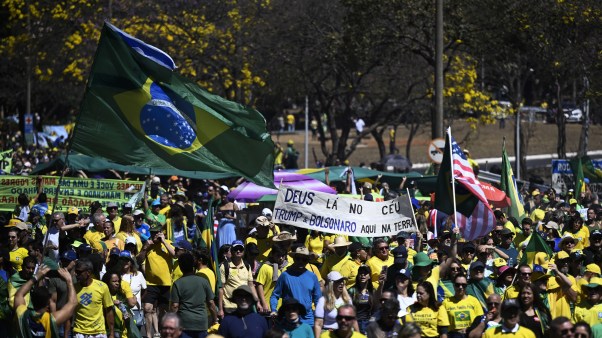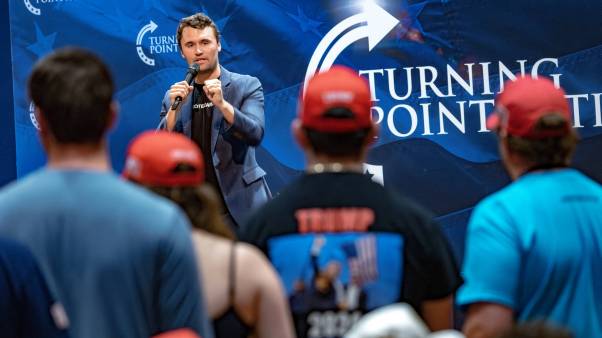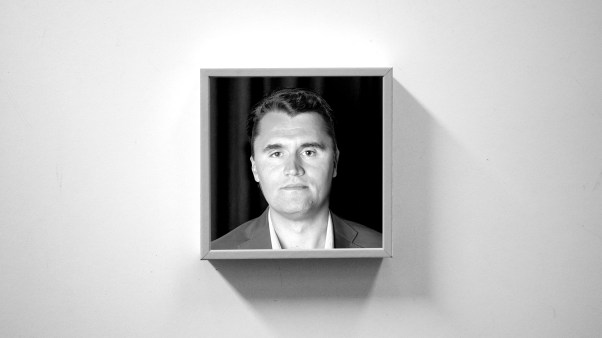There are some vague references to the UPI story, including this comment from NCC General Secretary Bob Edgar: “Unlike the simplistic picture presented by some who manipulate religious animosity and add fuel to the flames consuming Sudan, [our] information reflects the complexities of Sudan.” For example, the statement continues, “While it is generally acknowledged that the government of Sudan bears the greatest responsibility for human rights violations perpetrated during the conflict, not many people know that factionalism in the south has actually resulted in a greater number of deaths than clashes between government and rebel forces.” As Weblog noted earlier, the NCC’s “nonsimplistic” information has in the past also played down reports of religious persecution, saying that “civil war and racial hostility play a far larger role” than religious tensions. “What is reported as religious persecution is often understood locally as something quite different.”
In fact, Edgar’s recent statement does make mention of religious persecution, noting twice that, “Without peace, egregious violations of human rights, including religious persecution, are likely to continue in Sudan.” It also notes that Church World Service has done a lot of relief work in the area (though it should be noted that Church World Service is far more autonomous than it once was).
But Siemon-Netto’s point wasn’t about relief work; it was about advocacy. He compared the NCC’s silence on the Sudan genocide to the highly vocal stances it took for campaign finance reform and the Elián González controversy. Edgar’s statement says that the NCC has “pressed for policies and actions that will promote peace,” and has “expressed concern specifically over policies that we believe will exacerbate ethnic tensions in southern Sudan and place aid workers in jeopardy.” (It doesn’t say what policies.)
Does the NCC disagree with George Bush‘s statement that “We’re responsible to stand for human dignity and religious freedom wherever they are denied, from Cuba to China to southern Sudan”? Does it disagree with Al Sharpton‘s recent comment that “Slavery is wrong no matter who the slave master or the slave is. This is not about Muslims versus Christians. This is about right versus wrong”? Does it disagree with Franklin Graham that Sudan “has declared a jihad on its own people … It’s wrong. It’s wicked. And it’s evil”? Does it disagree with Siemon-Netto’s assertion that the fate of “those who burn to death, get raped, mutilated, tortured, enslaved and murdered in southern Sudan … is more important than campaign financing or, for that matter, the father of Elián González”? If not, why not take a stronger stand against religious persecution in the country?
More on Sudan:
- Sudan flogs 53 Christians for rioting (Associated Press/Los Angeles Times)
- Easter crusade canceled after threats | Violence erupted after threats from suspected terrorist Osama bin Laden and other Muslim extremists had forced Christian leaders to cancel a mass rally celebrating Good Friday in Khartoum. (UPI)
- Clashes over church services | Sudanese Christians were arrested and others injured on Wednesday as they protested against a government order to transfer Easter services from central Khartoum to the suburbs (UN Integrated Regional Information Network)
Sanctuary no more Not so long ago, churches were considered “sanctuaries.” That is, they offered asylum for criminals. This was, of course, because churches were seen as holy, consecrated places, and arrests by civil authorities would defile them—not to mention remove the opportunity for the criminal to seek spiritual help. How times have changed. A man wanted for murder in Texas was arrested in the parking lot of an Oklahoma City church over the weekend. But the suspect, Francisco Dias Perez, probably wouldn’t have received sanctuary in days of old either. According to television station KOCO, Perez was first apprehended for relieving himself near a car.
More on church-related crime:
- Church attacker convicted | The man who robbed and beat a 73-year-old woman as she prayed in a Solana Beach church will spend the next two decades behind bars. (KGTV, San Diego)
- Life-size statue of Jesus missing from church | During Holy Week, police say, it was removed from a cross and stolen from a La Crescenta Catholic congregation. (Los Angeles Times)
Other stories
Persecution:
- Vietnam ‘troublemakers’ face prosecution | “Strong measures [are to be taken against] those profiting from the Protestant faith … to bend the truth and sabotage the revolution,” says official with the ruling Communist Party’s provincial committee. (BBC)
- India, Pakistan in human rights battle | Faced with criticism on several counts of human rights violations from UN special reporters as well as nongovernmental organizations, their response has been to defend themselves by pointing fingers at each other rather than by making out a positive case for their own countries. (Asia Times)
Prisons:
- A spiritual approach to time behind bars | Many prisoners are turning their jail cells into monks’ cells. (The Christian Science Monitor)
- Washing of their feet touches inmates’ hearts | The ceremony, recalling Christ at the Last Supper, inspires prisoners at an Orange jail. And a retired bishop enjoys a new life. (Los Angeles Times)
- Scourge of rape in U.S. prisons sparks action | A coalition of religious and human rights groups is pressing for a federal law to make state prison authorities accountable for sexual abuse of prisoners by prisoners. (Reuters)
- Little sympathy or remedy for inmates who are raped | Widespread social reluctance to address the issue is reinforced by many legal constraints (The New York Times)
- Earlier: Brutality behind bars | Savage prison gang rapes turn many run-of-the-mill prisoners into violent felons-in-waiting. Reformers say it’s time to rein in jailhouse predators (World, Feb. 3, 2001)
Christians and Jews:
- Alleged remarks concern parents | Students complained that a visiting pastor said Jews killed Jesus. (The Miami Herald)
- It’s comical: P.C. vs. ‘B.C.’ | There’s nothing wrong with the modernization and diversification of a newspaper’s comics section. But as is typically the case with the liberal media’s narrow concept of “diversity,” some kinds of differences don’t count. Like spiritual diversity. (Michelle Malkin, New York Post)
Faith-based initiative:
- Private sector funds faith-based programs | Sources of private funding—individuals, foundations and corporations—seem to be more receptive to faith-based programs since President Bush took office (The Washington Times)
- Faith-based providers get the message | Religious groups hear Bush plan (New York Daily News)
- Americans conflicted over Bush’s faith-based initiative | Pollster Kim Parker discusses recent public-opinion research over the White House plan to funnel government aid through religious institutions. Theory and practice, says Parker, don’t necessarily mix (Time.com)
- President Bush’s faith-based giving program can pass constitutional muster | The issue: The White House initiative to provide funding for religion-based charities is being considered by Congress. (Editorial, The Honolulu Star-Bulletin)
Church and state:
- Grand Junction, Colorado, sued over commandments | ACLU suit alleges the city’s attempts to put the commandments in a secular context by adding a disclaimer and planning to surround the tablet with other historical monuments are “a sham.” (Denver Post and Associated Press)
- School prayer advances in House | Bill would allow prayer at graduations, athletic events and voluntary student gatherings at high schools. School boards could provide the option, but students would decide whether they want prayers at their events. (The Orlando Sentinel)
- Also: School-prayer bill moves forward in Florida House | High school students could lead prayers at school graduations and other assemblies that they aren’t required to attend under a bill ready for a vote by the state House. (Associated Press)
- Lawyer loses bid to abolish Christmas (Reuters)
- Keeping pace with the Amish | Safety lies at heart of road bill in Ohio (The Boston Globe)
- Judge upholds Witnesses’ right to preach | Court strikes down Quebec town’s by-law on door-knocking (The National Post)
- The Lord’s my insurer, says preacher accused of motoring offenses | His license plate is DEUT 818 (The Scotsman, also Ananova)
- Court voids statute on faith-based hiring | Montgomery law barred linking jobs to religion (The Sun, Baltimore)
Religion and politics:
- Critics blast GOP choice of Cleveland clergyman | A Cleveland minister who was fired in 1995 as a city police chaplain for making derogatory comments about Jews and Muslims is drawing fire again—this time because Republican congressional leaders have named him to an advisory panel on faith-based issues. (The Plain Dealer, Cleveland)
- Interest groups’ influence affected | Religious leaders who tend toward the liberal or moderate side have formed a new organization in the latest effort to counter the political clout of the Christian Coalition and other Christian conservatives. (Associated Press)
- Bush aims to strengthen Catholic base | Republicans seeking solid majorities among all white religious voters (The Washington Post)
- Bush’s born-again reign | President Bush says he decided to seek the White House after he heard God’s call. Now clergy members and religion experts say his born-again Christian convictions guide the direction and tone he is setting for the nation. (New York Daily News)
- Ralph Reed’s bid for Georgia chair divides GOP | The sharply contested race has triggered accusations of “anti-Christian bigotry” and a testy standoff between two prominent Republican pollsters. (The Washington Post)
- Also: Ralph Reed creates buzz in Georgia politics (The Washington Post)
Religion and censuses:
- Overseas missionaries don’t count, says court | Utah’s complaint that it lost a congressional seat because the Census Bureau did not count Mormon missionaries abroad is dismissed (Associated Press)
- Australians warned of fines if they list Jedi as religion on census | Those who follow e-mail campaign to get Star Wars religion official recognition could be charged with offering “false information” (Ananova)
Faith healing:
- Girl’s death brings ban on kind of therapy | Colorado outlaws faith healing (The New York Times)
- Owens signs faith-healing bill | Legislation makes faith healing a crime under the state’s child abuse law when used in place of medicine for a child in danger of dying. (Denver Post)
- Turning to God’s disciples when doctors don’t help | The moral of HBO’s documentary on faith healers, “A Question of Miracles,” seems to be “whatever gets you through the night.” (The New York Times)
Jane Fonda and Ted Turner:
- Ted Turner vs. Christianity | Mr. Turner’s comments and attitudinizing have cost him his job at AOL Time-Warner … and his wife. (Editorial, The Washington Times)
- Fonda Files for Divorce (The Telegraph, Associated Press)
- Ted Turner cites Jesus in split from Jane Fonda (The Times, London)
- Ted Turner considered suicide, Fonda reveals | “My becoming a Christian upset him very much for good reason. He’s my husband and I chose not to discuss it with him because he would have talked me out of it. He’s a debating champion.” (The Independent)
Sex and dating:
- Not until marriage | Teens are saying ‘I do’ to abstinence vows, but critics say the pledges don’t prepare them for the realities of sexuality (Chicago Tribune)
- Seek and ye shall find a wife on the Internet | Women are so reluctant to become vicars’ wives that clergy are having to turn to dating agencies to find love. (The Daily Telegraph, London)
- Earlier: Christian dating agency goes online to find perfect partners | A new dating agency for Christians is asking members to quote their favorite biblical passages and describe their religious beliefs in order to ensure that they are matched with their perfect partner. (The Daily Telegraph, Feb. 18, 2001)
Copyright © 2001 Christianity Today. Click for reprint information.
Related Elsewhere
See our past Weblog updates:April 18 | 17 | 16
April 12 | 11 | 10 | 9
April 6 | 5 | 4 | 3 | 2
March 30 | 29 | 28 | 27 | 26
March 23 | 22 | 21 | 20 | 19
March 16 | 15 | 13 | 12
March 9 | 8 | 7 | 6 | 5
March 2 | 1 | February 28 | 27 | 26








